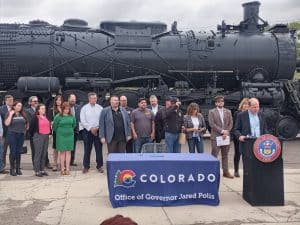You see headlines celebrating new laws, and receive our union’s messages asking for letters to our elected officials, but how does your advocacy lead to new laws? Here’s how the pieces fit together.
EAST PALESTINE AND THE RAIL SAFETY ACT
After the Feb 3rd, 2023, derailment in East Palestine, Ohio, the Rail Safety Act was introduced in Congress. The act will regulate safety issues like train lengths, blocked crossings, and protect the FRA’s minimum crew size rule.
But federal laws often follow states’ examples. To protect everyone, we begin in each state, each with its own challenges and opportunities.
Here’s how it worked in Colorado.

NEW LAWS TAKE HARD WORK AND OLD FRIENDS
Colorado’s State Legislative Director Carl Smith has lobbied for SMART-TD in the statehouse for years. The first step for Smith and the state legislative board was to draft a new bill. As part of SMART’s national network, he could put a Colorado twist on similar legislation from other states.
Even with the attention brought by East Palestine, Smith knew getting his bill passed would be a challenge. The 2023 legislature was mid-session, with little time left for debate and amendments. He met with the leaders of both the House and Senate to make his case, convincing Senate Majority Leader Dominick Moreno to sponsor the bill.
With Moreno’s support, Smith began refining the bill with industry and other key stakeholders. Creating a law that worked for everyone complicated things. As the clock started to run out on the 2023 session, Moreno recommended that Smith refine it over the summer, then reintroduce the bill.
SMART-TD BUILDS A COALITION
With more time to organize, SLD Smith was able to recruit others to his cause. As a member of the AFL-CIO Colorado Executive Board, Smith negotiated their support. Smith also connected with an old friend, the director of the Blue/Green Alliance, who signed on as an ally. Both organizations would provide invaluable lobbying muscle and research support.
BNSF’S TRAP: DEATH BY COMMITTEE
Over the summer, Smith developed the bill with advice from the Joint Transportation Legislation Review Committee. He learned that bills championed by this group are considered an easy win in the legislature, as members of both houses in the committee essentially preapprove the bills chosen to adopt.
Good news: By the end of summer, the committee had agreed to take up Smith’s rail safety bill.
Bad news: BNSF lobbyists, working behind the scenes, had manipulated the advice given to Smith. Instead of a sure thing, our bill would compete with a dozen other initiatives — things like free bus passes for schoolchildren or funding for repairs for neglected rural highways. The committee would only adopt five bills and BNSF was sure ours wouldn’t make the cut.
SMART-TD MEMBERS TIP THE BALANCE
BNSF underestimated our influence. Smith’s coalition continued lobbying the committee to select our bill, but it needed an extra push. The leader of the group, Rep. Ty Winter (R), represents the district with the largest number of active and retired SMART-TD members in the state. SLD Smith called for support, and our members rose to the occasion. As calls and letters rolled in, Winters realized his voters were paying attention and wanted the new law. He came around.
A LETHAL BNSF DERAILMENT CLOSES A COLORADO INTERSTATE. OUR BILL MOVES FORWARD
President Biden and Colorado Gov. Jared Polis were planning an unrelated speech in Pueblo, Colorado, just as the main road into the town was closed to clean up a BNSF derailment. The accident, with fatal results on the interstate below, reminded all that railroads deserve closer scrutiny.
The derailment happened Oct. 15, 2023. By the 23rd our bill, now known as House Bill 24-1030, had been selected for the 2024 legislative session.
GAME ON: SMITH EXPANDS HIS COALITION
With the AFL-CIO and the Blue/Green Alliance aboard, Smith began to assemble a larger coalition.
Friends from the Coalition of Professional Firefighters, American Federation of Teachers, Colorado Education Association and SMART Sheet Metal Local 9 joined. Smith also made a case to his contacts in Colorado’s powerful community of environmental groups. Conservation Colorado, the Sierra Club, Natural Resources Defense Council, Trout Unlimited and Green Latinos all agreed to back the cause.
While many of these organizations resist efforts to expand oil and coal production or to lay track through Colorado’s pristine wilderness, they are powerful allies in the fight for safer rail operations. They supported SMART-TD’s bill, then spread the word as momentum grew.
THE WHEELS OF GOVERNMENT TURN SLOWLY
H.B. 24-1030 was among the first bills accepted in the 2024 session, and one of the last to make it to Gov. Polis. Along the way Smith helped the bill through multiple hearings, revisions, and delays.
Hostile lobbying from Union Pacific softened the bill, who threatened to sue the state if the bill passed. They claimed that federal rules regarding train length, blocked crossings, trackside detectors and union access to private property conflicted with the bill. Whether UP would win the lawsuit or not, an active lawsuit with the state would take years to resolve. This would prevent the state from negotiating much-needed regional passenger rail with UP, which is a top priority for the Governor’s office.
“While the bill we passed isn’t exactly the bill we started with, the future office of rail safety will be an additional tool to provide a safe workplace for SMART-TD members and a safer community for Colorado citizens. The office will collect valuable data on long trains, trackside detectors, blocked crossings and rail accidents, which we can then use for stronger rail safety legislation in the future.” Smith said.
HB24-1030 was signed into law by Colorado Gov. Jared Polis in a signing ceremony on May 10, 2024. SMART-TD’s battle continues.
ONE STEP AT A TIME
Colorado is one step closer to responsibly managed freight rail, and the nation is one step closer to the Railway Safety Act. Incremental wins like these, sometimes years in the making, would not be possible without SMART-TD and our members. Our state legislative directors have the tenacity and the connections to get the job done, as Colorado’s win shows.
Each new law results from a similar fight for our members. Our legislators step up wherever railroads choose to put profits above safety, and operating efficiency above respect for the communities where they operate.
